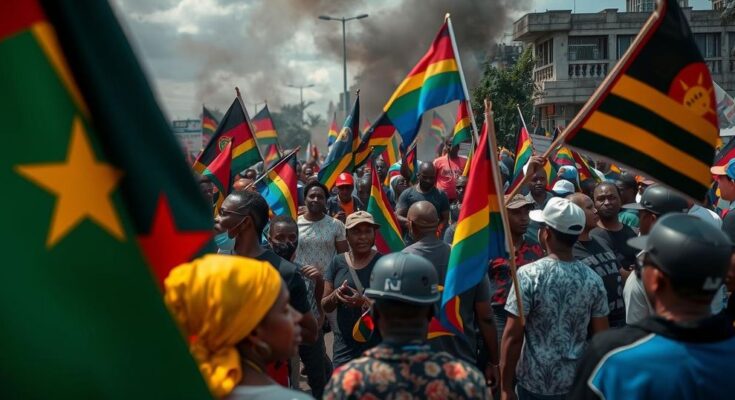Mozambique has experienced significant unrest following the October 9 elections, where the ruling party Frelimo was accused of election fraud. Widespread protests erupted in response, leading to violent police crackdowns, resulting in numerous deaths. The opposition has gathered strength, challenging Frelimo’s long-standing rule amid a backdrop of civil rights concerns and historical tensions, exacerbated by recent violent incidents against opposition figures.
The aftermath of Mozambique’s recent elections has been marred by widespread protests and a violent police response. The elections held on October 9 resulted in the ruling party, Frelimo, extending its longstanding dominance amid allegations of electoral fraud, including ballot manipulation and voter list irregularities. Protests erupted across the nation as opposition parties and many citizens accused the government of stealing the election, escalating tensions leading to a severe crackdown from security forces. Thirty days into the unrest, there have been reports of at least 20 confirmed fatalities due to police actions, with independent organizations suggesting the number may be over 50. Amidst the turmoil, the situation prompted neighboring South Africa to close its border with Mozambique, citing concerns about the violence spilling over. The Frelimo party has maintained control since Mozambique’s independence in 1975, and the recent elections marked a continuation of its rule with candidate Daniel Chapo declared as the victor. However, accusations of electoral fraud initiated a series of protests where demonstrators clashed with police, who resorted to using tear gas and rubber bullets. An international observer mission pointed out several irregularities during the election, raising questions about the validity of the results. Furthermore, the opposition has been vocal in condemning the actions of the ruling party, with calls for national strikes and additional protests. Pivotal to the growing unrest were the assassination of key opposition figures and ongoing police violence against peaceful demonstrations. Following the killings of his lawyer and a spokesperson, opposition candidate Venancio Mondlane fled for his safety, calling for continued resistance against Frelimo’s dictatorial grip. The overall atmosphere is one of heightened anxiety, with police enforced censorship on social media and severe measures taken to quell dissent. In addition to the public outrage, Mozambique continues to grapple with a distinct history of civil conflict, leading to the current political strife. Ultimately, this situation reflects a broader pattern of unrest in Mozambique as frustration over government corruption and oppression reaches a boiling point. The police’s aggressive tactics during the protests and the opposition’s determination to challenge the election results may portend further conflict as Mozambique navigates a period marked by heightened tension and potential instability.
Mozambique has a complex political history characterized by a civil war that ended in 1992, paving the way for democratic elections. The Frelimo party has ruled since the country’s liberation from Portuguese colonial rule but faces increasing challenges, particularly from disaffected youth and opposition parties such as Renamo and Podesa. Despite having mineral wealth and natural resources, governance issues, including widespread corruption and allegations of electoral fraud, have led to public dissatisfaction, culminating in the current protests following the October 9, 2024 elections. The fraught political landscape has intensified with allegations of violence against opposition members and bystanders, raising human rights concerns and inciting protests against the ruling administration.
The ongoing protests in Mozambique underscore the deep discontent among the populace regarding the electoral process and the government’s response to dissent. The Frelimo party’s prolonged rule is being challenged more vigorously than ever, especially in the light of significant allegations of electoral fraud and police brutality. The international community watches closely as the situation evolves, with neighboring states taking preemptive measures to guard against potential spill-over violence. The coming weeks will be crucial in determining whether Mozambique can stabilize or will descend further into unrest.
Original Source: apnews.com




